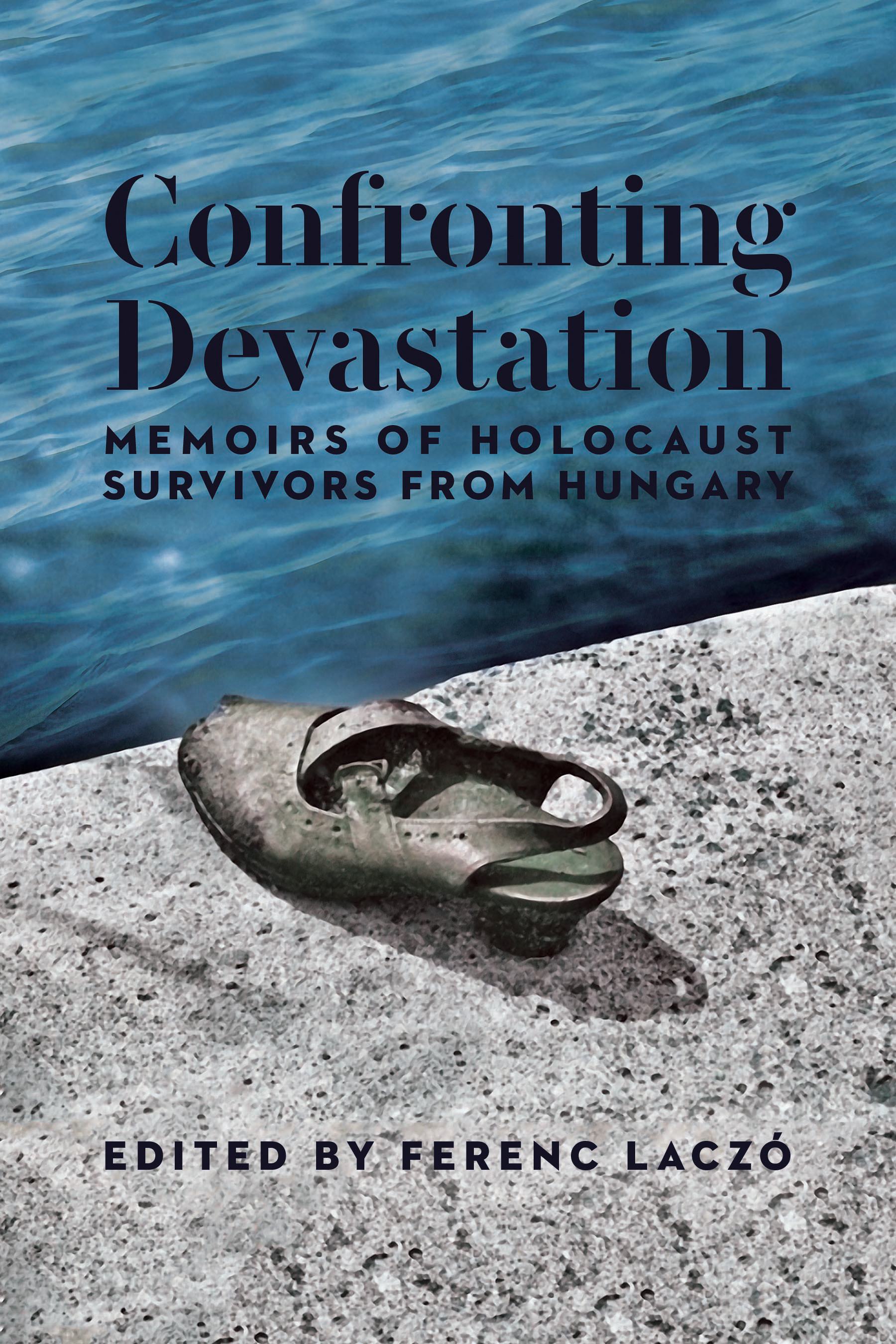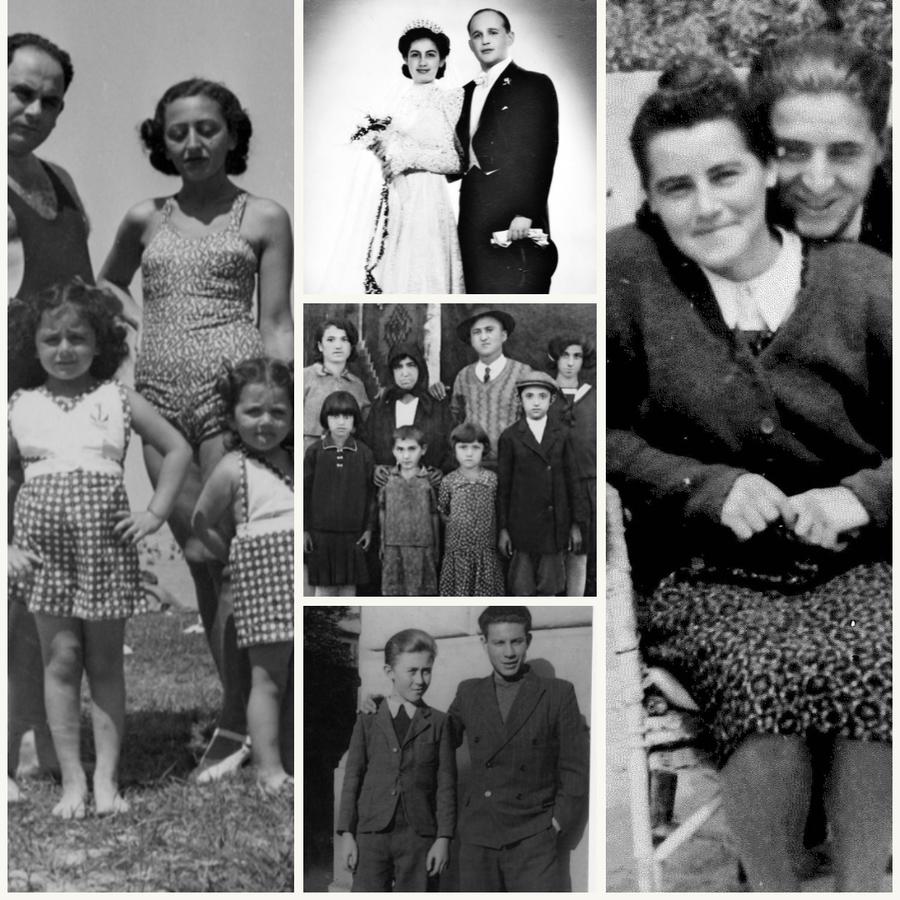Confronting Devastation: Memoirs of Holocaust Survivors from Hungary
Commemorating seventy-five years since Nazi Germany occupied Hungary, Confronting Devastation, an anthology of writing from Hungarian Holocaust survivors, examines the experiences and memories of the Holocaust in Hungary.

Top row, L-R: Sam (Sandor) Grad, Leslie Fazekas, Yittel Nechuma Bineth, Benedikt (Benő) Korda (né Kornreich) Z”L, Mark Lane, László Láng Z”L, Peter Vas Z”L
Middle, L-R: Alexander Eisen, Kathleen (Kati) Horváth (née Spitzer), Julius Jakab Z”L, Miriam Mózes, Ilonka (Helen) Rodak-Izso Z”L, Moishe Rosenschein Z”L, Imrich Vesely Z”L
Bottom, L-R: Victor David, Esther and Itzik (Ike) Davidovits Z”L, Eva Kahan Z”L, Veronika (Vera) Schwartz Z”L, Susan Simon, Dolly Tiger-Chinitz, Katalin (Kitty) Marianne Kenedi Z”L

From idyllic pre-war life to forced labour battalions, ghettos and camps, and persecution and hiding in Budapest, the authors reflect on lives that were shattered, on the sorrows that came with liberation and, ultimately, on how they managed to persevere. Editor Ferenc Laczó frames excerpts from some twenty memoirs in their historical and political context, analyzing the events that led to the horrific “last chapter” of the Holocaust — the genocide of approximately 550,000 Jews in Hungary between 1944 and 1945.

Forced exclusion and social integration, a worsening socioeconomic situation and the preservation of a few freedoms, mass violence and the seeming normality of everyday interactions: these were the polarities that defined Jewish experiences during the Hungarian years of persecution between 1938 and early 1944. Stories of the experiences of Hungary’s Jews in these years are remarkably diverse and even contradictory — which of the aforementioned experiences predominated in the life of individuals depended on their social status, age, gender and exact location, as well as sheer luck. These selected excerpts from memoirs of survivors offer precious insights into the contradictory experiences of everyday life, while also showing the worsening exclusion of those years.
* Text adapted from Ferenc Laczó’s foreword to the Daily Life section of Confronting Devastation: Memoirs of Holocaust Survivors from Hungary.
Read an excerpt:
Shattered Dreams by Dolly Tiger-Chinitz
Memory is like a stained-glass window. Every little piece fits together, but every little piece should be your own. As the window grows, your personality is formed. You will view the world through this window for the rest of your life. Everything that happens to you that you remember, and the way you place that memory into your window frame, will make you the person you are, different from everyone else in the world. Not only is what happened to you important, but also how you view what happened to you. And while I will try to give a more or less chronological account of what happened to me, where and how, I will sometimes digress and give you a little bit of that coloured stained glass that formed my window on the world.
Life, at first, seemed idyllic: walks in the many beautiful parks of Budapest, or on Margaret Island where we plucked daisies and braided them into wreaths for our hair or picked horse-chestnuts to later fashion into doll-sized furniture; the Gellért Hill with the concrete slides in the summer and sledding in the winter; the beautiful chapel carved out from the rock, complete with a cave where a hermit dwelled. The Korzó on Sunday mornings, where we met other young girls being paraded by equally beautiful and fashionable mothers. But Mari and I were the only twins I can remember, which made us feel very special.
Budapest was a dream city. Tourists crowded the outdoor cafés, the women were chic, the cafés noisy and the air heavy with perfume, excitement and joie de vivre. The Prince of Wales visited, and the city was abuzz with his antics, with the debauchery that was too much for even the fun-loving Hungarians.
Spring was a time when on street corners young girls with round wicker baskets offered tiny bouquets of violets for sale, when the horse-chestnuts and the acacia trees were in bloom, when the amusement park opened its gates again and members of society went to the Gundel restaurant. Winter was the season when elegant people hurried to the cafés, the restaurants and the theatres, when the shore of the Danube River was transformed into a pine forest of Christmas trees for sale, and smells of incense wafted out of churches where the beautiful nativities were set up — our governess smuggled us in frequently. Christmas cards were displayed on the street by heavily clad women, and the smell of roasted chestnuts drifted in the bitingly cold air.

Jews and other distrusted social groups were excluded from military service but were not relieved from having to serve the country and its army. Compulsory labour service (kötelező munkaszolgálat) was established by law in 1939 for individuals the regime deemed unreliable, targeting mostly Hungarian Jews. By 1940, there were approximately sixty units consisting entirely of Jewish labour servicemen. The enrolled individuals were not allowed to carry weapons and worked mostly on construction sites and in mines. Upon Hungary’s entry into the war in 1941, labour servicemen also often had to perform life-threatening tasks during combat, such as clearing minefields, and tens of thousands of servicemen perished during the war. The personal stories here offer intimate perspectives and numerous intriguing insights into this unusual and sinister institution.
* Text adapted from Ferenc Laczó’s foreword to the Labour Battalions section of Confronting Devastation: Memoirs of Holocaust Survivors from Hungary.
Read an excerpt:
Like Slaves in Pharaoh’s Time by Itzik Davidovits
In 1941 I arrived in Pétervására and was taken to an open field in an abandoned village. There were barns all around the fields. I couldn’t wear my own clothes. I was given a uniform and a hat, but no shoes, so had to use the shoes I was wearing. There were only Jews here, and we had Hungarian soldiers watching over us. I quickly started to realize that I was not in the army as a soldier, but instead was a prisoner of forced labour, like the Jews who were slaves in Pharaoh’s time. Sentenced to hard labour by the Hungarians, I was forced to build their roads and dig their trenches, with little food and shelter and under inhumane conditions. We were routinely beaten and tortured. The Hungarians told us that we had no privileges except to die.
The Hungarians didn’t like it if we didn’t speak their language, but I couldn’t speak Hungarian; I spoke only Yiddish and Romanian. Every day I would write letters home to my mother and to my girlfriend, and every day I hoped and prayed that I would receive letters back, but I never did. Then one day the Hungarian soldiers showed us what they were doing to our mail. It was a letter from my girlfriend. They brought it to me and showed me that they had this letter from her and then they ripped it up in front of my eyes. They said that if our mail wasn’t written in Hungarian they would tear it to pieces.
Up until July 1942 we still had army clothes, but that all changed when we reached Jolsva (now Jelšava, Slovakia), our last stop before the Soviet front. We were given orders to write home to our families to ask them to send us civilian clothing. We each had to have our own suitcases with our names on them and we had to get blankets from home. The only things they gave us were a cap and boots. When our suitcases arrived, I had to give in my uniform and change into the civilian clothes my mother sent me.
One night after dinner, the head officer in charge of our division came out and lined us up. He was our new commander, and would prove to be more brutal than our last one. He proceeded to say that we had been selected to go to the front to dig trenches for the Hungarian and German soldiers. He said that it was our duty to obey orders, and that whoever did not follow orders would be punished or shot. He was speaking directly to us, the Jews. He turned to the Hungarian soldiers who were not Jewish and said, “Your duty as Hungarians is to make sure that the Jews get their work done and that they obey your orders. If they don’t obey, make sure they are punished or shot.” He also told his officers that the sooner they kill all the Jews, the sooner they will return home to their families in Hungary.
The first day, we marched all night. By morning, ten of us had been beaten to death for no reason at all. Then we arrived at the front near the edge of the Don River. There were landmines everywhere, which we were ordered to clear for the Hungarians. We proceeded very carefully so as not to get blown up. We then started to build roads for the Germans and dig trenches with our shovels and picks. We dug trenches deep and wide enough to hide a tank. We had to work very hard as the ground was like concrete. We worked through the night so that we would not be seen, and during the day we marched about one and a half kilometres back to a village. We slept during the day in dilapidated, abandoned houses left behind by civilians.

Clockwise, from top: 1. Kati Horvath and her husband, Paul (Pali), on their wedding day. Budapest, Hungary, 1938. 2. Eva Kahan and her fiancé, Lajos, during their engagement. Óbuda, 1944. 3. László Láng with a friend from MIKÉFE (Hungarian Jewish Craft and Agricultural Association). Budapest, Hungary, 1942. 4. Susan Simon (front, left) on vacation with her family in Siófok, Hungary, early 1940s. 5. Itzik Davidovits’s family before the war. Back row, left to right: his sister Esther; his mother, Feige (Fanny); his brother Simcha; and his sister Ruchel. In front, left to right: his sisters Brauna (Betty), Henia and Frieda, and Itzik. Remete, Romania, circa 1932.

March 19, 1944, marks the beginning of the Hungarian “year of extermination.” The memoir excerpts describe experiences within the short-lived ghettos in Hungary outside of Budapest, as well as the mass deportations that followed the creation of these ghettos between mid-May and early July 1944. The majority of Hungary’s sizable Jewish population, about 437,000 individuals, were deported, nearly all of them to Auschwitz-Birkenau. Most of those deported were murdered almost immediately upon their arrival there. Only a small fraction of Jews deported from Hungary in those months were sent to other camps.
The approximately 100,000 Hungarian Jews who survived the initial selection round in Auschwitz-Birkenau — and all our memoirists recalling this most infamous camp complex by necessity belong to this minority — were used as forced labourers and were often transported to other camps. As many camps were evacuated amidst the final collapse of the Nazi regime to pre-empt their liberation by the fast-approaching Allies, their gravely weakened inmates were forced to march towards unknown destinations. The disturbing memories of these deadly marches often proved to be as traumatic as those of the camps.
* Text adapted from Ferenc Laczó’s foreword to the Ghettos and Camps section of Confronting Devastation: Memoirs of Holocaust Survivors from Hungary.
Read an excerpt:
Amid the Burning Bushes by Helen Rodak-Izso
The tragic day arrived when our street was to be emptied. We were being deported. We felt that we were looking around our home for the last time. We had to be ready to leave, since the Hungarian police were waiting for us, but we weren’t aware of what was happening around us. We were being forced to leave this place, where we had been together, where we had had our meals, talked, read books. Our life was being halted for some reason, but why? We had spent so many happy hours here, simply living the life of a family. We looked around to say goodbye to the familiar furniture, pictures, walls, and all of a sudden everything came alive and felt important. We discovered things that we hadn’t bothered to look at before. Oh, how it hurt to close the doors behind us! Once more we looked down at the garden, which was blooming in the usual spring colours. The sky was blue, but for us everything was grey.
…
The next tragic date was June 2, 1944, and it arrived just like the dreadful day of an execution: it was now the turn of our group, the fourth and last one in Kassa. We were forced to leave our hometown and enter occupied Polish territory. From the moment of our entry into Auschwitz-Birkenau, we were frightened all the time, wondering what more could come next. We kept on thinking all the time, yet we were trying to avoid the question we feared the most: what had happened to our dear parents upon our arrival?
We were too afraid to believe what we had heard on the Appellplatz. The dreaded notion that we had been deceived slowly crept into our minds, and with closed eyes and trembling hearts we tried to hope against hope. We were not awake; we were in a daze, just moving about mechanically. We didn’t grasp yet what was going on, that we had lost our family, our home and everything.
Even the little bag with our most cherished family pictures had been brutally and senselessly taken away from us. It dawned on us that we had no right to anything anymore. There was no way out, and it felt as if a dark curtain had descended in front of us, blocking the view to the outside world. The gnawing pain became unbearable, but this was not the place or time for emotion. We were deprived of everything that makes a human being into a person.
Meanwhile the gas chambers were working full time.

Budapest was home to the second-largest urban Jewish community in Europe prior to World War II, and the memoirs recount the unique horrors faced by these Jews during the Holocaust. After Regent Horthy was removed from power in mid-October, the ruling Arrow Cross forced the masses of Budapest Jews — who had already been segregated into individual buildings but not into separate areas of the city — into two separate ghettos.
Whatever semblance of order still remained in the capital after mid-October now broke down as Arrow Cross thugs, who were often very young, started to terrorize the citizenry. They randomly murdered thousands of the surviving minority of Hungarian Jews, including by shooting them into the icy Danube River. Along with the threat of death from illness or starvation, the Allied air raids constituted another source of constant danger for the Jewish population still in Budapest — a danger shared with the other inhabitants of the city.
* Text adapted from Ferenc Laczó’s foreword to the Budapest section of Confronting Devastation: Memoirs of Holocaust Survivors from Hungary.
Read an excerpt:
The Light in a Dark Cellar by Susan Simon
When it all started, I was more afraid of the sirens than the bombs. The drawn-out, high-pitched blast seemed to land right inside my head, seeping down to invade my heart till it froze in terror. As the war progressed, sirens were followed by explosions, and I learned to reserve my fears for the latter. Eventually there were no sirens at all; life turned into a perpetual night in underground cellars, where the sound of bombs and buildings crumbling were all we could hear.
In the early stages of the war, with sirens alerting the public, Rozi and I had to grab a bag filled with food, drink, a first-aid kit and toys and run as fast as we could. If I was in the washroom, Mother waited for me. When the sirens were not enough to penetrate my childish sleep at night, she woke me up and urged me to hurry. In the cellar we gave silent thanks for arriving in one piece.
Windows were covered with black paper, and cracks were filled with caulk to shroud our house in darkness at night. Rumours circulated about cellars collapsing, as well as the buildings above them, but Mother didn’t pass on such gossip to us so the threats would not ruin our hopes.
We had to wear a yellow star above our hearts to identify us as Jews, and we were allowed to leave our homes for an hour or two at certain times to buy food. Scared to walk with our stars, our heads buzzing with horror stories about how Jews were killed on the streets, we rarely stepped outside. It didn’t help that Nazi propaganda was spread on huge posters, glaring from rooftops. One of them showed a little girl covered with vivid splashes of blood, holding a toy that had exploded in her hands. This shocking scene blamed the Allied forces for throwing down explosives in the shape of toys from their airplanes. In truth, only the Nazi imagination could invent such crimes. Confused, Rozi and I thought of this disturbing picture before we fell asleep, particularly because the little girl on the poster had a sweet baby face with big blue eyes, just like Rozi. This likeness terrified her.
The Arrow Cross, the Hungarian party closely allied with the Nazis, took over the government on October 15, 1944. Shortly after this event, they passed a law ordering the Jews in the capital to move into a ghetto.
My family had already escaped a ghetto in the small town of Gyöngyös; Mother didn’t want to enter another one. She decided that we should hide.

The stories of liberation highlight both the hopes and new sorrows brought by the end of the Nazi genocide. The authors recall the often downright brutal treatment they received from members of the Red Army, their nominal liberators, including acts of gendered violence (another taboo topic in post-war Hungary) and the often insensitive or even malevolent approach to their recent past by other members of Hungarian society and the emerging communist establishment. The memoir excerpts paint a complex and nuanced picture of liberation.
* Text adapted from Ferenc Laczó’s foreword of the Liberation section to Confronting Devastation: Memoirs of Holocaust Survivors from Hungary.
Read an excerpt:
To Start off as a Christian but to Arrive as a Jew by Eva Kahan
One morning we finally saw the first Soviet soldiers. We were relieved and happy to reach the day we had been waiting for so long. Unfortunately, these soldiers turned out to be a great disappointment. They were wild, unreliable and cruel. I was just as afraid of them as I had been of the Germans. Of course, we understood that they were fighting for their survival and hated all Hungarians (Jewish or not). After being on the front lines for years, they suffered and saw so much that they forgot how to be human. Stealing, raping, killing meant nothing to them. The war was still far from over. We lived in the northern part of Pest, and the Germans were still holding on downtown, where the ghetto was located.
…
Soon, after we heard that the Soviets had liberated the ghetto, we went to see my grandfather. He was okay because he was with his sons and their families all along. I heard from him that my father was in the ghetto in the house of the Jewish Council. We were surprised. Why would he be in the ghetto when he had false documents? Well, we immediately went there and found him sick, lying on a wooden bench. We wanted to take him with us but he was too weak to walk. We promised to be back for him. The next day we borrowed a sled and took a bagful of food with us and went back to the ghetto. I will never forget the children on the street begging for food; as we gave some to one or two of them, a whole bunch kept on following us. Also engraved in my memory of the ghetto is the heap of corpses in a yard, bodies of mostly old people and children in their underwear, on top of each other.
ABOUT THE EDITOR
Ferenc Laczó is assistant professor in history at Maastricht University. He is the author of Hungarian Jews in the Age of Genocide: An Intellectual History, 1929–1948 (2016) and co-editor (with Joachim von Puttkamer) of Catastrophe and Utopia: Jewish Intellectuals in Central and Eastern Europe in the 1930s and 1940s (2017).
BUY THE BOOK
ARE YOU AN EDUCATOR? Place your order here.




